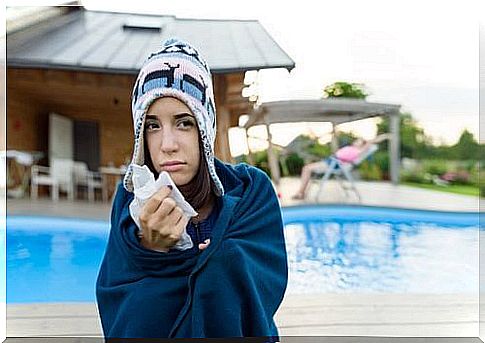Chlorine Water In Swimming Pools: Can It Cause Allergies?

In this article you will learn how chlorine water in swimming pools can cause certain allergies and how to prevent and treat them so that you can enjoy your summer to the fullest.
Chlorine water in swimming pools can cause respiratory allergies
For many people, the smell of chlorine water in swimming pools brings them back to happy times in the water, fun with the family or perhaps swimming lessons at school. But there are others who might associate it with breathing problems and allergies.
Although chlorine water is there for the sake of hygiene, it is also a very strong and potentially harmful thing for our health.
Chlorine water in swimming pools can cause allergies in both children and adults. When it comes to very young infants, it can increase their risk of getting respiratory diseases such as asthma.
The consequences are usually the same with both indoor and outdoor swimming pools. The likelihood of getting sick depends on how much time you spend in the pool, how often you are there, and how much water you may ingest.
The younger the children, the more vulnerable they are to developing allergic reactions to chlorinated water. One of the first symptoms is irritation of the eyes and nose. There may also be coughing, vomiting or breathing problems.

Chlorine water in swimming pools can cause skin allergies
When it’s hot outside, we often think of doing anything to cool down. And if we are lucky enough to have a swimming pool at home or with a friend, then we feel like the luckiest people in the world.
However, diving into the chlorine water can have some unwanted effects on our skin. This is because the chlorine in the water used to keep the water clean can dry out our skin and thus make it very sensitive to allergic reactions.
The parts of the body that are most affected are the eyes, the nose and our genitals. That our eyes turn red after many hours in the water is a clear sign of what chlorine water in swimming pools does to the skin and the rest of the body.
Chlorine increases the dryness of the skin, especially if we are in the water every day. It is important to understand that the skin is protected by a layer that is minimized and even completely removed if exposed to chemical products. However, it mostly happens to people with already sensitive or thin skin.
And not only that – chlorine also affects your nails and your hair, especially if you are fair-haired. But is chlorine the only substance that should be blamed?
In fact, there are other cleansing products in swimming pools that can be harmful to our health. There are products such as copper sulfate, iron and other metals.
How to avoid allergic reactions to chlorine?
Since chlorinated water in swimming pools is used to disinfect and reduce the amount of certain bacteria – such as E. coli – and at the same time keep the water in a good condition for a long time, we have to change our habits. In this way we best avoid developing allergies:
- Do not stay in the water for more than one hour in a row.
- Wear goggles, earplugs or nose clips as well as a bathing cap for your hair.
- Take a thorough bath as soon as you are up by the pool. Also, be sure to wash your swimwear thoroughly.

- Avoid swallowing water from the pool.
- Combine swimming pools with harbor baths, beach baths or lake baths.
- Find swimming pools and pools that are not crowded or avoid the busy hours.
- Ask the staff about their cleaning methods.
- For the pool at home you can use lighter chlorine products.
It is true that chlorine water in swimming pools can cause allergies in some people. But if you use the product properly, you can enjoy a summer in the pool without any problems.









